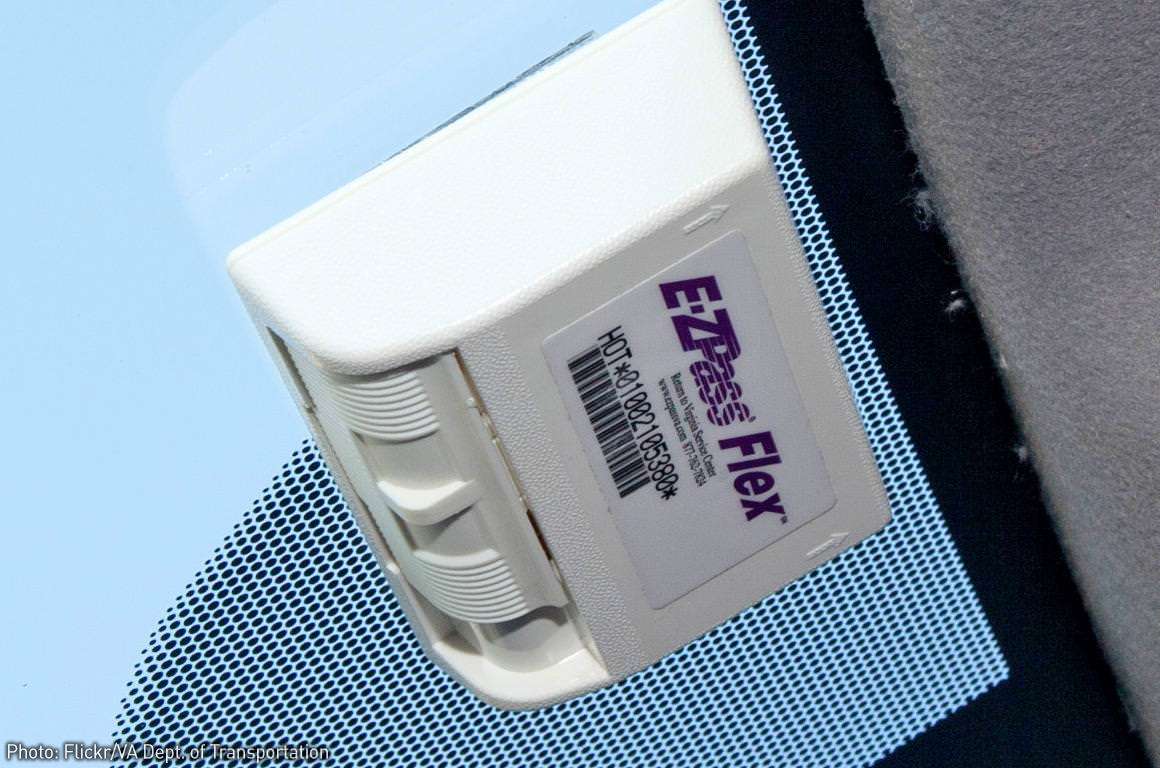Yes, Toll Booth Scan Devices Can Be and Are Scanned Elsewhere
The New York Civil Liberties Union Maps All the Other Places Your Tool Booth Pass is Being Read.
Way back in 2003, in a more innocent time, I wrote a long cover feature for Reason which spitballs a bit about the dangers of a fully electronically surveilled society, in the context of tech millionaire John Gilmore's by now oh-so-quaint failed fight to be able to get on a plane without showing ID because of government demand. The next year, Declan McCullagh wrote a famous cover story called "Database Nation" taking a measured look at the advantages of a world where all sorts of data was collated and saved about us in all sorts of places.

It's always nice, though, to at least know where and when we are having data on us collected via the magic devices of the world of tomorrow, today!
A recent report from the New York Civil Liberties Union reveals some things about the use of E-ZPass toll scanners in that state that most people probably didn't know, even if they might have darkly suspected.
How the NYCLU found out:
In late 2013, NYCLU staff went on a car ride with a privacy activist who designed a cow-shaped device that mooed every time it detected signals on the same frequency that E-ZPass readers use. We listened as the cow mooed its way through Midtown and Lower Manhattan — though we weren't at any toll plazas, something was reading the E-ZPass tag in our car.
This prompted us to file New York Freedom of Information Law (FOIL) requests to find out why E-ZPass readers had been installed far from any toll booths for some purpose unrelated to their intended use, and what privacy protections, if any, were in place. Earlier this week, the NYCLUreleased the result of that investigation (part of a new webpage that hosts records obtained through FOIL requests on how government agencies are collect information on New Yorkers).
The full article will tell you, with a map, all the non-toll-booth places your E-ZPass is being read in the Big Apple.
So, what's going on?
….both city and state transportation agencies have set up E-ZPass readers around the state as part of technology-based traffic management programs. Under a program called Midtown in Motion, for example, the city Department of Transportation initially installed 100 microwave sensors, 32 traffic video cameras and E-ZPass readers at 23 intersections to measure traffic volumes and congestion. By July 2014, that program had expanded to 149 E-ZPass readers around the city.
Outside of New York City, the State Department of Transportation in partnership with other entities has set up a similar traffic management program that scans E-ZPass tags on major transportation corridors, away from toll plazas.
The NYCLU would prefer public privacy policies in place to make sure this "traffic" data remains anonymous, and perhaps allows for opting out. But "the New York City Department of Transportation stated in response to the FOIL that it had no policies or training materials on storage, retention, destruction or use of the information collected from its E-ZPass readers."
In the NYCLU's perspective:
Toll booth transponders such as E-ZPass were created for one specific purpose: smoothing the flow of traffic at toll booths. We've already seen the technology abused for political purposes. The fact that they're now being repurposed to track cars around the streets of New York without adequate public notice is exactly the kind of mission creep that we always warn against with powerful tracking technologies.
I emailed yesterday with a private investigator pal about this, Emmanuelle Richard (who is also the wife of Reason editor-in-chief Matt Welch). While she didn't know anything about how and where this particular E-Zpass data was used, she was aware that some states do use such data for other purposes, or sell it to commercial database companies. License Plate Recognition is another source of state surveillance whose information does trickle out to the commercial markets for repo men and private eyes, as well as law enforcement of course.
Richard told me of areas where citizens might like a more intelligent use of license plate info with law enforcement where it could help the citizen, but where alas it does not. She points out that the cops have "tons of photos of our car to be able to fine us if it was parked illegaly, but when the car was stolen last year, the police took two weeks to report that the thieves had crossed several bridges to New Jersey and back. Of course, the thieves were never stopped, even though our license plate was scanned again and again! The police called me only when they found the carcass of the car…"
It is true, she says, that the government does "share and make money off our data without disclosing it and without giving us the option of opting out, but I guess that they assume that when driving, we have no expectation of privacy. From a professional perspective [as a private investigator], I find this data very useful to locate people and determine their activities."
For those of us who might ever worry we'll be on the other side of a private investigation, or a public one, that's not super encouraging. But it is the world we live in: the electronic tracking of us is ubiquitous, and in many ways oh-so-convenient. People seem to love their tool booth reader thingamabobs. But as the NYCLU has discovered for us, they can be used for more than we bargained for when we put them in our car.


Show Comments (32)